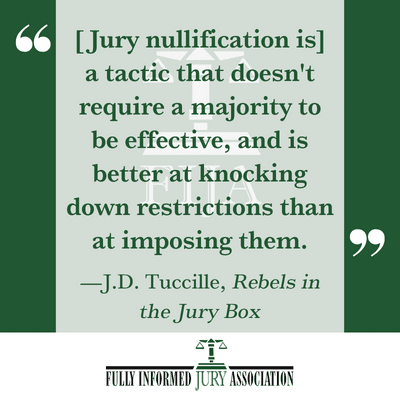Rebels in the Jury Box
by J.D. Tuccille

Being part of a relatively small minority of folks can be difficult sometimes. That's especially true when your minority consists of people who want to be left alone, and are willing to give others the same consideration, but the world around you is run by soccer moms and the grown-up versions of the kids who volunteered to be school hallway monitors. With every losing vote the walls close in just a bit more.
That's probably why jury nullification—the right of jurors to find defendants "not guilty" even in defiance of a judge's instructions and the law—has drawn such an enthusiastic reception from libertarians. It's a tactic that doesn't require a majority to be effective, and is better at knocking down restrictions than at imposing them.
By now, some of the history of jury nullification may be familiar.
The Fully Informed Jury Association (FIJA)—the most active and vocal jury nullification advocacy organization—talks of John Peter Zenger, who was arrested in 1734 for "seditious libel" against the colonial governor of New York at a time when ticking off politicians was a crime in and of itself. "Then, as now the judge said the 'issue of law' was for the court to determine, and he instructed the jury to find the defendant guilty. It took only ten minutes for the jury to disregard the judge's instructions and find Zenger not guilty."
The International Society for Individual Liberty (ISIL) goes back further, tracing nullification's roots to England and Magna Carta.
In particular, ISIL mentions the "1670 trial of William Penn for preaching Quakerism to an unlawful assembly. Four of the twelve jurors voted to acquit and continued to acquit even after being imprisoned and starved for four days. ...Chief Justice Vaughan held that jurors could not be punished for their verdicts." (Imprisoned and starved? I bet most modern jurors would fold if they missed an episode of "Ally McBeal.")
The power and right of juries to act as a sort of final veto on bad laws and worse prosecutors found a warm welcome among early Americans.
The Cato Institute's Clay S. Conrad, who penned the definitive book Jury Nullification: The Evolution of a Doctrine, wrote that, "[j]urors in early American knew that if a criminal law was unjust, they could—and should—refuse to enforce it. They could vote their conscience, and as free citizens they were expected to do so."
Conrad quotes John Adams to the effect that, "It is not only [the juror's] right, but his duty... to find the verdict according to his own best understanding, judgment, and conscience, though in direct opposition to the direction of the court."
With John Adams on their side, early American jurors apparently nullified rather enthusiastically. According to Conrad, "[j]urors in early 19th-centruy America routinely refused to enforce the Alien and Sedition Act, just as jurors in mid-19th-century America widely rejected the Fugitive Slave Act and juries in early 20th-century America refused to enforce Prohibition."
Of course, ignoring judges and legislators and telling prosecutors to take a hike gets those folks bent out of shape. Over the years, judges have done their best to conceal the whole existence of nullification from jurors in an attempt to convert the people's representatives in a trial into verdict machines who enforce the law without question.
The result of efforts to keep juries under control is what Prof. James Joseph Duane of Regent University referred to in an article for Litigation magazine as "the top secret constitutional right. " Says Duane, "[j]udicial hostility to jury nullification goes well beyond the stone wall of silence erected around the jury box. Case after case has approved jury instructions actualy designed to imply that jurors do not have such power at all."
Such efforts have grown more desperate in recent years, with judges going so far as to remove jurors who refuse to convict.
In one incident, a juror who raised jury nullification during deliberations in a drug case was actually prosecuted. Laura Kriho, the juror charged with contempt of court for bucking the system, was eventually cleared, but the legal drawing-and-quartering was a shot across the bow to potential jurors everywhere.
Why the harsh tactics?
It likely has something to do with the resurgent popularity of jury nullification. The doctrine may be an official pariah in legal circles, but regular folks like it just fine.
According to a 1999 Washington Post article, "[in] courthouses across the country, an unprecedented level of juror activism is taking hold, ignited by a movement of people who are turning their back on the evidence they hear at trial and instead using the jury box as a bold form of civil protest."
You just know that's rubbing the legal priesthood the wrong way
It was probably inevitable, of course. As Conrad points out in his book, "[t]rying to keep juries in the 1990s from finding out about their power to nullify laws they find morally objectionable is like trying to keep teenagers from fining out about sex: if they do not learn about it from a responsible source, they are increasingly likely to learn about it on the streets."
Well, whether those of us advertising the power of the jury can be considered "responsible sources" or "the streets," we know when we've found a handy tool for trumping those soccer moms and hallway monitors.
Source:
The text was reproduced with gracious permission of the author from an old printout of a now defunct web page. The original seems to have been published on the former Free-Market.net sometime in 2004, though an exact date cannot be identified. The Free-Market.net website has since been taken down. Many of the embedded links that were in the original article are either no longer available or could not be found.
